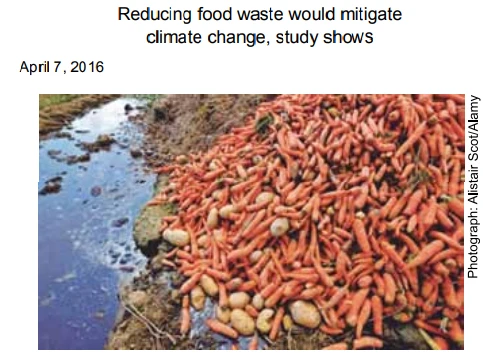Disciplina: Inglês 0 Curtidas
According to the information presented in the fourth - UNIFESP 2017

Reducing food waste around the world would help curb emissions of planet-warming gases, lessening some of the impacts of climate change such as more extreme weather and rising seas, scientists said on Thursday.
Up to 14% of emissions from agriculture in 2050 could be avoided by managing food use and distribution better, according to a new study from the Potsdam Institute for Climate Impact Research (PIK). “Agriculture is a major driver of climate change, accounting for more than 20% of overall global greenhouse gas emissions in 2010,” said co-author Prajal Pradhan. “Avoiding food loss and waste would therefore avoid unnecessary greenhouse gas emissions and help mitigate climate change.”
Between 30 and 40% of food produced around the world is never eaten, because it is spoiled after harvest and during transportation, or thrown away by shops and consumers. The share of food wasted is expected to increase drastically if emerging economies like China and India adopt western food habits, including a shift to eating more meat, the researchers warned. Richer countries tend to consume more food than is healthy or simply waste it, they noted.
As poorer countries develop and the world’s population grows, emissions associated with food waste could soar from 0.5 gigatonnes (GT) of carbon dioxide equivalent per year to between 1.9 and 2.5 GT annually by mid-century, showed the study published in the Environmental Science & Technology journal. It is widely argued that cutting food waste and distributing the world’s surplus food where it is needed could help tackle hunger in places that do not have enough – especially given that land to expand farming is limited.
But Jürgen Kropp, another of the study’s co-authors and PIK’s head of climate change and development, told the Thomson Reuters Foundation the potential for food waste curbs to reduce emissions should be given more attention. “It is not a strategy of governments at the moment,” he said.
(www.theguardian.com. Adaptado.)
According to the information presented in the fourth paragraph, there is an indication to
-
expand agriculture to tackle hunger.
-
revert industrial and agricultural development.
-
decrease food waste and redistribute food where necessary.
-
limit population growth.
-
control carbon dioxide emissions from all sources.
Solução
Alternativa Correta: C) decrease food waste and redistribute food where necessary.
A alternativa C é a resposta correta porque, no quarto parágrafo, o texto enfatiza a importância de reduzir o desperdício de alimentos e redistribuir o excedente para combater a fome em regiões que carecem de alimentos. O autor menciona que “é amplamente argumentado que cortar o desperdício de alimentos e distribuir o excedente do mundo onde é necessário poderia ajudar a combater a fome”, destacando uma solução prática para um problema global.
Além disso, a afirmação de que “especialmente dado que a terra para expandir a agricultura é limitada” implica que, em vez de simplesmente aumentar a produção agrícola, é mais eficaz otimizar o uso dos recursos existentes e redistribuir o que já está disponível. Essa abordagem é não apenas sustentável, mas também uma resposta direta às crescentes necessidades alimentares da população mundial, conforme indicado nas preocupações com o aumento das emissões associadas ao desperdício de alimentos.
As outras alternativas, como a expansão da agricultura (opção A) ou a reversão do desenvolvimento industrial e agrícola (opção B), não são sugeridas no texto. A limitação do crescimento populacional (opção D) e o controle das emissões de dióxido de carbono de todas as fontes (opção E) são abordagens mais amplas que não refletem a solução específica apresentada pelo autor sobre a importância de reduzir o desperdício de alimentos e redistribuí-los adequadamente. Portanto, a alternativa C captura com precisão a mensagem central do parágrafo e as implicações para a mitigação da fome e das emissões de gases de efeito estufa.
Institução: UNIFESP
Ano da Prova: 2017
Assuntos: Interpretação Textual em Inglês
Vídeo Sugerido: YouTube